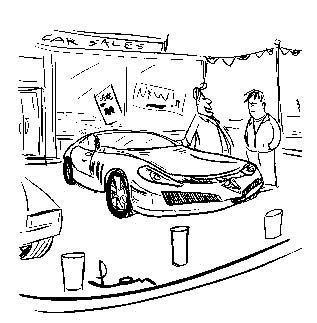The lintel across the kitchen doorway comes up to my collarbone so I need to duck as I go through. A grinning toy duckling suspended by its neck from the lintel by a piece of cotton attached to a drawing pin is there to remind me. Usually I stoop just low enough to feel his little feet dance across my hair as I pass. But on this occasion I was looking down at my phone, and, presuming that my head was low enough, going full steam ahead into the kitchen. The next thing I knew, I was lying flat on my back on the living-room rug and the top of my head felt wet.
I went upstairs and stuck my head under the bath’s cold tap and kept it there until red turned to clear. Then I blotted the red from the rug and stair carpet with a damp face flannel and towel-dried my hair. Then I shut and locked the front door behind me and followed the winding path up through the woods to the car.
Twenty minutes later I’d paid my three quid to the guide and about 20 of us were headed across open moor towards the best preserved pre-Christian religious site in the district. At the bottom end is a 3,000-year-old menhir, or standing stone. Above that, a stone circle, then a double stone row, perhaps 200 yards long. Incorporated into the stone row, about halfway along, is a granite-lined burial chamber which once accommodated what my old guidebook calls ‘a person of consequence’.
These ancient artefacts stand in a vast natural amphitheatre bounded on three sides by smoothly rounded hills. The fourth side, facing to the south-west, is wide open, and we could see for 30 miles across lush farmland down to the sea. The hills to the west are the higher. They are embossed with granite tors, which stood out in sharp silhouette against the skyline. From where we now stood beside the menhir, the guide pointed out that one of these tors appeared to have a square, sun-sized slot. It was the evening before the summer solstice, and we’d come to witness the sun slipping neatly into this slot, lending credence to the theory that whatever else they were, menhir, circle and double stone row were also a kind of celestial calendar.
The exact time of the summer solstice was not until 11.28 the next morning, but we were as close to it as made no difference, said the guide, who, though quite elderly, could barely restrain his excitement. The weather up here being what it is, he said, fiddling frantically with his compact camera, this was the first sun’s descent into the slot for many years that wouldn’t be obscured by cloud or fog.
We were a subdued and reverent little crowd. Silent or whispering couples mostly. Two or three contemplative singletons, one mildly concussed. Some of us, I feel sure, were hoping that if we laid ourselves open, as it were, we might experience something of what the ancients felt at this significant juxtaposition of sun and earth.
We formed into a ragged line of orange-faced acolytes. Added celestial drama was lent by the shimmering blob of a newly risen planet and a strengthening half-moon. With ten minutes to go and the rim of the rapidly descending sun nearly touching down on the hill, it seemed most unlikely that the sun would slip across and finish nestling in the nick in the skyline. The angle seemed too acute and the remaining distance too far.
I noticed that the woman beside me was speaking. She was speaking to me. She was talking about Dr Who. Had I seen it? It’s brilliant, she said. I haven’t got a telly, I said. Not because I’m snobbish about telly, I added, but because I can’t get a signal. She didn’t have a telly either, she said. When Dr Who was on, she caught the bus over to her sister’s and watched it there. It was the only thing she bothered to watch, she said. I felt that she might be a bit lonely, and I wished I could have shared her enthusiasm for Dr Who, and perhaps begun a relationship with her based on our shared interest in the show. Then she said, did I know I had blood coming out of my ear?
I was about to reassure her that she was mistaken, that it was probably trickling down from the top of my head, when the sun, rather incredibly, given the acuteness of the angle right to the last, fitted itself exactly into the slot in the granite tor, then disappeared behind the hill, its light gone out, and we all clapped. It was a bit like applauding a long red at a snooker match. Looking around I saw our elderly guide standing oddly erect, his face alive with priestly fervour.







Comments